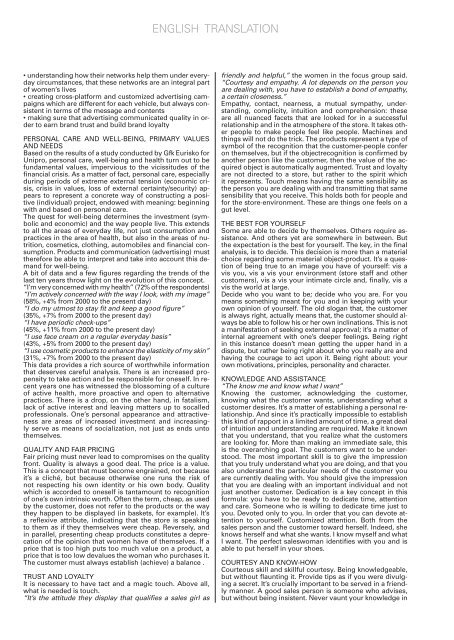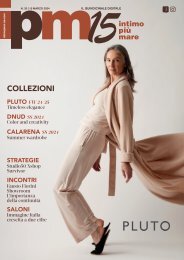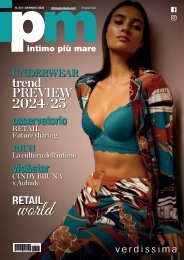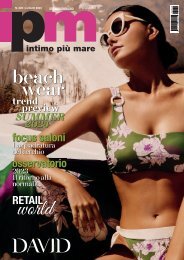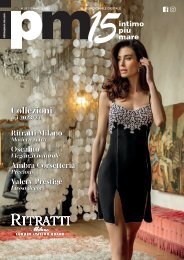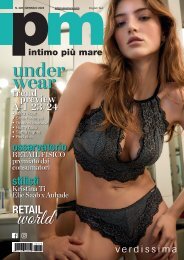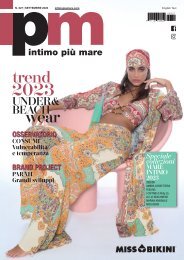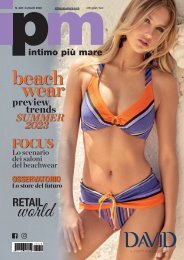You also want an ePaper? Increase the reach of your titles
YUMPU automatically turns print PDFs into web optimized ePapers that Google loves.
ENGLISH TRANSLATION<br />
• understanding how their networks help them under everyday<br />
circumstances, that these networks are an integral part<br />
of women’s lives<br />
• creating cross-platform and customized advertising campaigns<br />
which are different for each vehicle, but always consistent<br />
in terms of the message and contents<br />
• making sure that advertising communicated quality in order<br />
to earn brand trust and build brand loyalty<br />
PERSONAL CARE AND WELL-BEING, PRIMARY VALUES<br />
AND NEEDS<br />
Based on the results of a study conducted by Gfk Eurisko for<br />
Unipro, personal care, well-being and health turn out to be<br />
fundamental values, impervious to the vicissitudes of the<br />
financial crisis. As a matter of fact, personal care, especially<br />
during periods of extreme external tension (economic crisis,<br />
crisis in values, loss of external certainty/security) appears<br />
to represent a concrete way of constructing a positive<br />
(individual) project, endowed with meaning: beginning<br />
with and based on personal care.<br />
The quest for well-being determines the investment (symbolic<br />
and economic) and the way people live. This extends<br />
to all the areas of everyday life, not just consumption and<br />
practices in the area of health, but also in the areas of nutrition,<br />
cosmetics, clothing, automobiles and financial consumption.<br />
Products and communication (advertising) must<br />
therefore be able to interpret and take into account this demand<br />
for well-being.<br />
A bit of data and a few figures regarding the trends of the<br />
last ten years throw light on the evolution of this concept.<br />
“I’m very concerned with my health” (72% of the respondents)<br />
“I’m actively concerned with the way I look, with my image”<br />
(58%, +4% from 2000 to the present day)<br />
“I do my utmost to stay fit and keep a good figure”<br />
(35%, +7% from 2000 to the present day)<br />
“I have periodic check-ups”<br />
(45%, +11% from 2000 to the present day)<br />
“I use face cream on a regular everyday basis”<br />
(43%, +5% from 2000 to the present day)<br />
“I use cosmetic products to enhance the elasticity of my skin”<br />
(31%, +7% from 2000 to the present day)<br />
This data provides a rich source of worthwhile information<br />
that deserves careful analysis. There is an increased propensity<br />
to take action and be responsible for oneself. In recent<br />
years one has witnessed the blossoming of a culture<br />
of active health, more proactive and open to alternative<br />
practices. There is a drop, on the other hand, in fatalism,<br />
lack of active interest and leaving matters up to socalled<br />
professionals. One’s personal appearance and attractiveness<br />
are areas of increased investment and increasingly<br />
serve as means of socialization, not just as ends unto<br />
themselves.<br />
QUALITY AND FAIR PRICING<br />
Fair pricing must never lead to compromises on the quality<br />
front. Quality is always a good deal. The price is a value.<br />
This is a concept that must become engrained, not because<br />
it’s a cliché, but because otherwise one runs the risk of<br />
not respecting his own identity or his own body. Quality<br />
which is accorded to oneself is tantamount to recognition<br />
of one’s own intrinsic worth. Often the term, cheap, as used<br />
by the customer, does not refer to the products or the way<br />
they happen to be displayed (in baskets, for example). It’s<br />
a reflexive attribute, indicating that the store is speaking<br />
to them as if they themselves were cheap. Reversely, and<br />
in parallel, presenting cheap products constitutes a deprecation<br />
of the opinion that women have of themselves. If a<br />
price that is too high puts too much value on a product, a<br />
price that is too low devalues the woman who purchases it.<br />
The customer must always establish (achieve) a balance .<br />
TRUST AND LOYALTY<br />
It is necessary to have tact and a magic touch. Above all,<br />
what is needed is touch.<br />
“It’s the attitude they display that qualifies a sales girl as<br />
friendly and helpful,” the women in the focus group said.<br />
“Courtesy and empathy. A lot depends on the person you<br />
are dealing with, you have to establish a bond of empathy,<br />
a certain closeness.”<br />
Empathy, contact, nearness, a mutual sympathy, understanding,<br />
complicity, intuition and comprehension: these<br />
are all nuanced facets that are looked for in a successful<br />
relationship and in the atmosphere of the store. It takes other<br />
people to make people feel like people. Machines and<br />
things will not do the trick. The products represent a type of<br />
symbol of the recognition that the customer-people confer<br />
on themselves, but if the objectrecognition is confirmed by<br />
another person like the customer, then the value of the acquired<br />
object is automatically augmented. Trust and loyalty<br />
are not directed to a store, but rather to the spirit which<br />
it represents. Touch means having the same sensibility as<br />
the person you are dealing with and transmitting that same<br />
sensibility that you receive. This holds both for people and<br />
for the store-environment. These are things one feels on a<br />
gut level.<br />
THE BEST FOR YOURSELF<br />
Some are able to decide by themselves. Others require assistance.<br />
And others yet are somewhere in between. But<br />
the expectation is the best for yourself. The key, in the final<br />
analysis, is to decide. This decision is more than a material<br />
choice regarding some material object-product. It’s a question<br />
of being true to an image you have of yourself: vis a<br />
vis you, vis a vis your environment (store staff and other<br />
customers), vis a vis your intimate circle and, finally, vis a<br />
vis the world at large.<br />
Decide who you want to be; decide who you are. For you<br />
means something meant for you and in keeping with your<br />
own opinion of yourself. The old slogan that, the customer<br />
is always right, actually means that, the customer should always<br />
be able to follow his or her own inclinations. This is not<br />
a manifestation of seeking external approval; it’s a matter of<br />
internal agreement with one’s deeper feelings. Being right<br />
in this instance doesn’t mean getting the upper hand in a<br />
dispute, but rather being right about who you really are and<br />
having the courage to act upon it. Being right about: your<br />
own motivations, principles, personality and character.<br />
KNOWLEDGE AND ASSISTANCE<br />
“The know me and know what I want”<br />
Knowing the customer, acknowledging the customer,<br />
knowing what the customer wants, understanding what a<br />
customer desires. It’s a matter of establishing a personal relationship.<br />
And since it’s practically impossible to establish<br />
this kind of rapport in a limited amount of time, a great deal<br />
of intuition and understanding are required. Make it known<br />
that you understand, that you realize what the customers<br />
are looking for. More than making an immediate sale, this<br />
is the overarching goal. The customers want to be understood.<br />
The most important skill is to give the impression<br />
that you truly understand what you are doing, and that you<br />
also understand the particular needs of the customer you<br />
are currently dealing with. You should give the impression<br />
that you are dealing with an important individual and not<br />
just another customer. Dedication is a key concept in this<br />
formula: you have to be ready to dedicate time, attention<br />
and care. Someone who is willing to dedicate time just to<br />
you. Devoted only to you. In order that you can devote attention<br />
to yourself. Customized attention. Both from the<br />
sales person and the customer toward herself. Indeed, she<br />
knows herself and what she wants. I know myself and what<br />
I want. The perfect saleswoman identifies with you and is<br />
able to put herself in your shoes.<br />
COURTESY AND KNOW-HOW<br />
Courteous skill and skillful courtesy. Being knowledgeable,<br />
but without flaunting it. Provide tips as if you were divulging<br />
a secret. It’s crucially important to be served in a friendly<br />
manner. A good sales person is someone who advises,<br />
but without being insistent. Never vaunt your knowledge in


